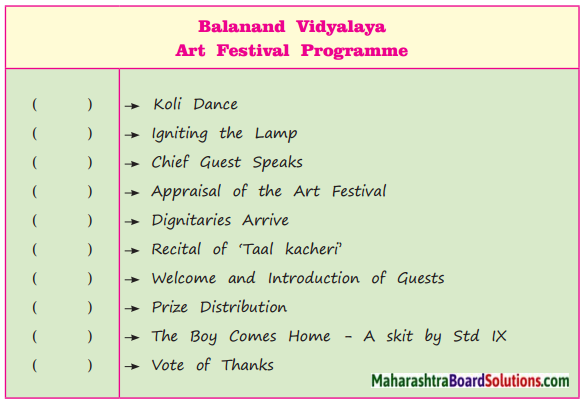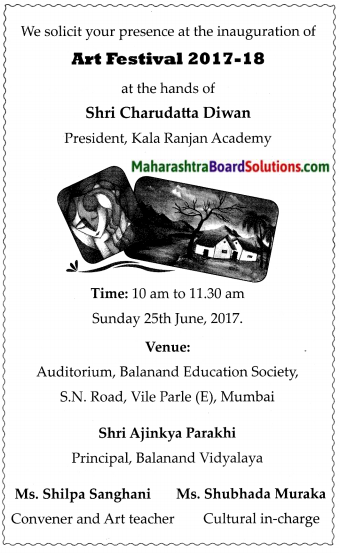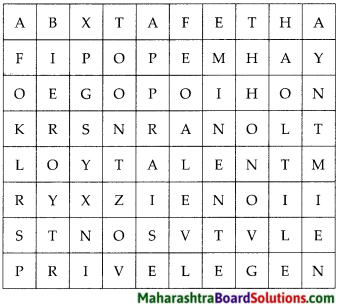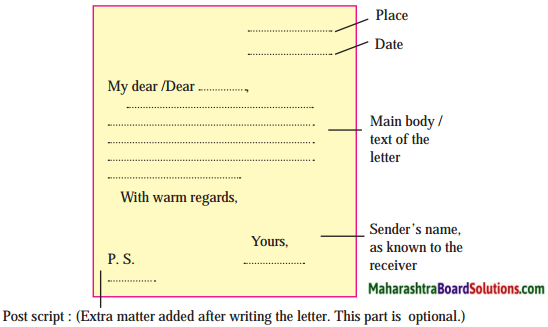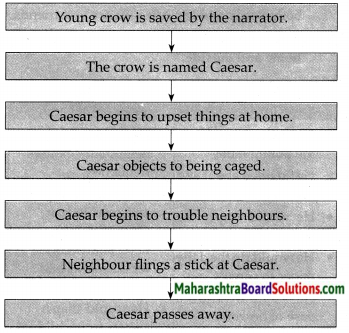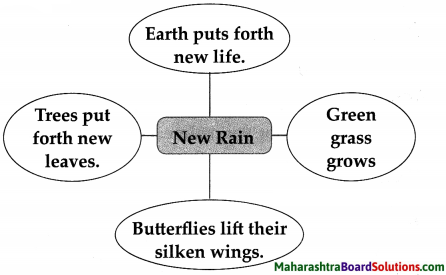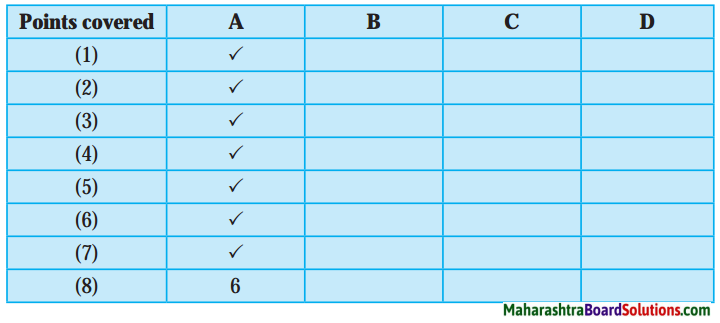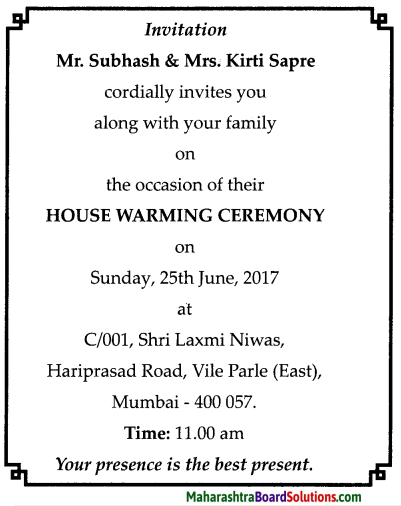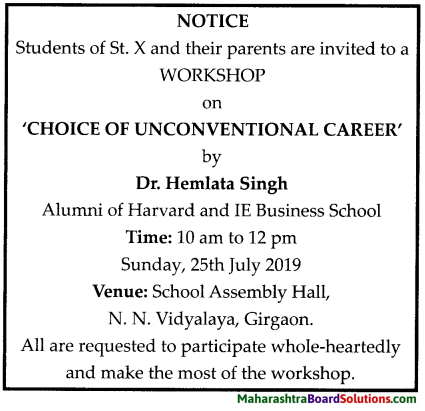Balbharti Maharashtra State Board Class 7 English Solutions Chapter 3.5 News Analysis Notes, Textbook Exercise Important Questions and Answers.
Maharashtra State Board Class 7 English Solutions Chapter 3.5 News Analysis
Class 7 English Chapter 3.5 News Analysis Textbook Questions and Answers
1. Write your own impression about the news items given in (a), (b), (c), (d) in the table given below.
Question 1.
Write your own impression about the news items given in (a), (b), (c), (d) in the table given below.
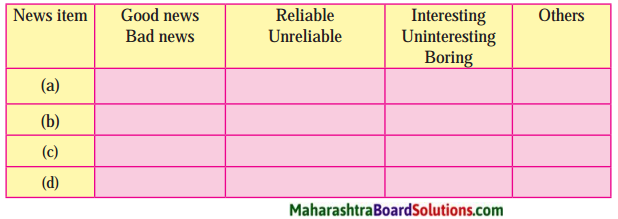
Answer:
| Good/Bad News | Reliable/ Unreliable News | Interesting/ Uninteresting/ Boring | others |
| good | reliable | interesting | Lists down DO’s and DON’TS for candidate. |
| bad | unreliable | boring | No authenticity. Might be based on rumours. |
| bad | reliable | interesting | Creates an awareness about environmental problems. |
| bad | unreliable | boring | Highlights the need to adopt a more scientific attitude. |
![]()
2. Write a letter to your class teacher or the Principal of your school to make any one of the following requests.
a. You wish to start a news bulletin for your school/class. It will be a one-page bulletin to be published every week. A different group of students will manage the preparation of the bulletin every time.
Answer:
C/1, Elixir Apartments,
V. S. Road,
Dadar (West),
Mumbai – 400 028.
7th July, 2017.
To
The Principal,
St. John’s School,
Dadar (West),
Mumbai – 400 028.
Sub: Request to start a news bulletin. Respected Sir,
I, XYZ, the monitor of VII – B, would wish to request you to grant us permission to start a news bulletin for our school. As part of the Literary Club activity, the bulletin will serve as a platform for those who wish to enhance their writing skills and try their hands at journalism right in school.
The bulletin would be a single page weekly, covering news related to schools in our neighbourhood and their notable innovative activities and of our own school activities, achievements and programmes. This gives opportunity to students to scout around, explore and express their observations, thoughts and ideas and expose them to a new career option for later life.
Kindly consider my earnest request and grant us the permission so that the Literary Club may flourish –
Thanking you,
Yours truly,
XYZ
b. Your school library subscribes to a few newspapers. Your class wants old issue of the newspaper for some educational activity in the classroom. You are required to make cuttings/news clipping. Therefore, the papers cannot be returned to the liabrary but you will use them in a responsible manner. Use the format of a formal letter given below.
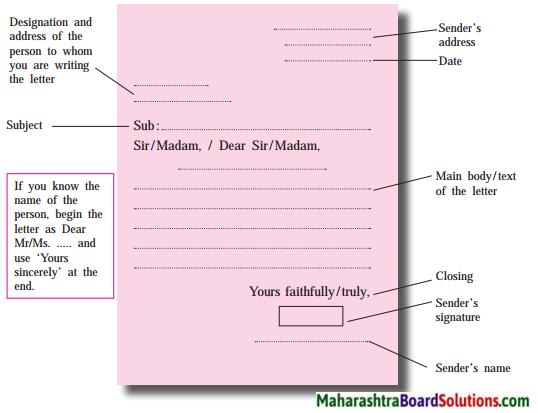
Answer:
C/1, Elixir Apartments,
V. S. Road,
Dadar (West),
Mumbai – 400 028.
7th July, 2017.
To
The Principal,
St. John’s School,
Dadar (West),
Mumbai – 400 028.
Sub: Request to issue old newspapers for a project.
Respected Sir,
I, XYZ, of class VII-B would wish to request you to grant us permission to use old newspaper clippings from the Library for our English project.
The project aims at making us aware of various types of news articles, the language used in newspaper reports and enable us to compare and see the changes that have taken place in terms of presentation and news that is printed. However, we do not have access to newspapers of the past five years.
May I earnestly request you to allow us to make use of newspaper clippings of the last five years from the school Library? I assure you that the newspaper will be used in a responsible manner.
We intend to hold competitions that will further encourage students to put in their best. Your support and guidance will help serve the purpose better.
Thanking you,
Yours truly,
XYZ
![]()
3. Hold a discussion in the classroom about the differences between printed newspaper, radio news bulletins, T.V. news bulletins.
Question 1.
Hold a discussion in the classroom about the differences between printed newspaper, radio news bulletins, T.V. news bulletins. Discuss the merits, demerits and popularity of each.
Answer:
The merits and demerits of the print Media are as follows:
a. Print Media (Newspapers):
Merits: These are more accessible. They are available at a low cost. They are also delivered at one’s doorstep. Besides this, one can always choose to read news of one’s choice by just turning over the pages. More suitable for senior citizens who are not tech-savvy.
Demerits: The illiterate cannot make use of the Print Media. It occupies more space after some time when the newspapers pile up. Usually the news articles are based on the thought process of the owners of the Newspaper advertisements news articles.
b. Electronic Media:
Merits: As the T.V. is an audiovisual medium it appeals to the sense of hearing and sight. The illiterate can have entertainment as well as information. It is more lively as the person can see the reporter or the panel discussing a given topic. Various news channels offer a wide variety of topics and programmes. An animated map with weather forecast is much more interesting to see as compared to reading it in black and white.
Demerits of Electronic media: Electronic media includes radio, television tablets, all phones etc. with the flooding of TV channels, cell phones with enormous features etc have enslaved man. People are hooked on to these items and direct human communication has broken down within the families too. The reason is everybody is busy with either the TV or cell phone most of the time. Children are also hooked on to these from a very early stage in life. These technologies also bring with them problems of radiation and health risks and take away personal time.
Class 7 English Chapter 3.5 News Analysis Additional Important Questions and Answers
Answer in one sentence.
Question 1.
Who is Stephen Hawking?
Answer:
Stephen Hawking was a physics professor.
![]()
Question 2.
Why did people flock to Ralewadi?
Answer:
People flocked to Ralewadi to get a special powder from Miribaba that was supposed to cure all ailments.
Question 3.
What was the cost of the herbal powder packet?
Answer:
The packet of powder was priced at Rs. 25/-
Question 4.
Name some herbs?
Answer:
Some Common herbs are ginger, tulsi, mint.
Simple Factual Questions.
Question 1.
Complete the web diagram with all non-electronic items prohibited in the examination hall as per the news item.
Answer:
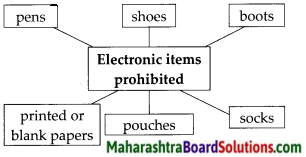
Question 2.
What is the meaning of issued, candidates and invigilators?
Answer:
- issued – distributed.
- candidates – a person who applies for some job (here).
- invigilators – people who watch students taking an exam.
![]()
Complex Factual Questions.
Question 1.
Who is conducting the test?
Answer:
Shivam Institute of Innovative Technology in Bengaluru is conducting the test.
Vocabulary.
Question 1.
Form four 4 letter words from the following:
- Bengaluru
- prestigious
- examination
Answer:
- Bengaluru – Bengal, bugle, lure, rule, glue
- prestigious – Press, rest, gist, sprout, priest
- examination – name, exam, mine, animation, nation
Grammar.
Question 1.
The pens will be provided in the hall by the invigilators. (Begin with ‘………….. The invigilators’)
Answer:
The invigilators will provide the pens in the hall.
Personal Response.
Question 1.
Why is this news published in newspapers?
Answer:
This news is published in the newspaper to make the readers and other institutions aware of the steps some educational institutions are taking to prevent malpractices during exams. It also prepares the candidates taking the exam by distributing a ‘Do’s and ‘Don’ts list beforehand.
![]()
Simple Factual Questions.
Question 1.
What words are used for the following in the news item:
1. Film industry.
2. Something on which a lot of money is spent.
Answer:
1. Film industry – Bollywood.
2. Something on which a lot of money is spent – big-budget.
Complex Factual Questions.
Question 1.
Guess why ‘Ant’ is a big-budget movie?
Answer:
’Ant’ could be a big-budget movie as it must be an animated film with a lot of sound and visual effects and also because the makers had roped in Ritika, a highly paid Bollywood star.
Question 2.
What will be Ritika’s reaction to this news?
Answer:
Ritika might be surprised to read this news as there may be no truth in it.
![]()
Vocabulary.
Question 1.
Guess the meaning of ‘most highly paid’, ‘revealed’, ‘sign films’.
Answer:
- most highly paid – someone who is paid the highest amount of salary.
- revealed – to make something new known to others.
- sign films – to agree to do a film by signing a contract.
Grammar.
Question 1.
She refused to give any reasons for her decision. (Change into a negative sent)
Answer:
She did not give any reasons for her decision.
Question 2.
Make adjectives.
Answer:
1. heart
2. decision
3. reason
Answer:
1. hearty
2. decisive
3. reasonable
![]()
Personal Response.
Question 1.
Can you think of other reasons for Ritika’s decision to not sign any more movies after ‘Ant’?
Answer:
There could be many reasons for Ritika’s decision to not sign any more movies after ‘Ant’ like disillusion with film world, desire to seek work in some foreign country, the urge to raise a family and settle down, etc.
Simple Factual Questions.
Question 1.
Which words or phrases in the news refer to the earth?
Answer:
The word ‘planet’ and ‘world’ in the news refer to the earth.
Complex Factual Questions.
Question 1.
Which of the following problems do you believe is the most serious:
a. climate change,
b. overpopulation,
c. epidemic diseases?
Answer:
Overpopulation is the most serious problem faced by the world today leading to a host of other problems.
![]()
Question 2.
Within two minutes tell as many words as possible related to the following words:
Answer:
a. news – reporters, T.V, radio, crime, politics, movies, sports, newspaper, responsibility
b. T.V. – serials, sports, music, entertainment, education, innovation, remote control, news channels.
c. radio – AIR, Akashwani, Radio Mirchi, news, songs, recordings, talks, interviews.
d. mobile – messages, Whatsapp, charger, camera, music, games, internet, connectivity, camera, instant communication, global.
Vocabulary.
Question 1.
Guess the meaning of ‘mankind’?
Answer:
mankind – human race.
Grammar.
Question 1.
1. Hawking said that the world today is facing huge challenges.
2. We have only one planet and we need to work together to protect it.
Answer:
1. that
2. and
![]()
Question 2.
Make verb.
Answer:
- dangerous – endanger
- work – work
- challenge – challenge
Personal Response.
Question 1.
Prof. Hawking wrote about the problem in the Guardian. Why is it given as ‘news’ in other papers?
Answer:
Although Prof. Hawking wrote about the problem in the Guardian, it is given as ‘news’ in other papers to create awareness about the gravity of the situation and the need to take urgent, constructive steps to protect our planet from further degradation by mending our ways. As the problem in discussion concerns the whole world, putting it in other papers will help spread awareness and take some corrective steps.
Fill in the blanks.
Question 1.
1. He has developed this powder from a special herb in the …………… .
2. Dr. …………… of Ambegaon Civil Hospital said number of patients increased in last few weeks.
Answer:
1. Himalayas
2. Karnik.
![]()
Complex Factual Questions.
Question 1.
Why is there a question mark in the heading?
Answer:
There is a question mark in the heading as the article leaves it on us to decide or find out the truth about Miribaba’s cure. The question mark indicates that it is not certain whether the powder has the power to cure ailments.
Question 2.
Which part of the news is reliable? Which part may not be reliable? How do we learn that?
Answer:
A report from Dr. Karnik of Ambegaon civil Hospital that there was an increase in member of patients in the last few weeks is probably more reliable. It could be that people out of blind faith went to Miribaba with their problems and were treated with some unnamed herbal powder. When their problems got out of hand or did not get better, they must have visited the civil hospital.
The claim of Miribaba’s followers that the herbal packs blessed by him cured thousands of people may be a story to cure more people towards Baber.
Question 3.
Will Miribaba and his followers like the news?
Answer:
Miribaba and his followers will definitely not like the news.
Vocabulary.
Question 1.
Guess the meaning of ‘flock’ and ‘followers’.
Answer:
- flock – gather or move in large numbers
- followers – people supporting someone whom they believe in disciples.
Grammar.
Question 1.
Hundreds of people flock every hour to Ralewadi. (Frame a Wh – question to get the underlined word as an answer)
Answer:
Where do hundreds of people flock every hour?
![]()
Question 2.
Each packet is specially blessed by him. (Separate the subject and predicate)
Answer:
Each packet – Subject is specially blessed by him – Predicate.
Personal Response.
Question 1.
What should you do when you fall ill?
Answer:
When one falls ill one mus identify the cause of the discomfort and how it can be set right with rest and correct food. Safe home remedies could be tried and if no improvement is found, one should consult a doctor immediately.
Language Study.
Question 1.
Complete the table.
Answer:
| Noun | Verb | Adjective | Adverb |
| innovation | innovate | innovative | innovatively |
| measurement | measure | measurable | measurably |
| decision | decide | decisive | decisively |
| danger | endanger | dangerous | dangerously |
Make sentences using the following phrases/ idioms, also write its meaning.
Question a.
to break someone’s heart – to make someone very sad.
Answer:
I kept up my promise of taking my five-year-old nephew out as I didn’t want to break his heart.
![]()
Question b.
to flock – to gather.
Answer:
Thousands of flamingoes flock to Sewri every year.
Question 2.
She refused to give any reasons for her decision. (Make negative)
Answer:
She did not give any reasons for her decision.
Question 3.
We have the technology to destroy the planet on which we live. (Add a question tag)
Answer:
We have the technology to destroy the planet on which we live, don’t we?
Question 4.
We will have built colonies amid the stars. (Rewrite in Future Perfect Continuous tense)
Answer:
We will have been building colonies amid the stars.
![]()
Question 5.
The world today is facing huge challenges. (Rewrite ending with world today’)
Answer:
Huge challenges are being faced by the world today.
Question 6.
She wants to make a career in politics. (Use Modal auxiliary of possibility)
Answer:
She might want to make a career in politics.
Question 7.
Hawking wrote recently in the Guardian newspaper. (Write in question form)
Answer:
Didn’t Hawking write in the Guardian newspaper recently?
Question 8.
Mankind is facing the most dangerous time in its history today. (Rewrite using ‘Positive degree’)
Answer:
No other time faced by mankind in its history is as dangerous as today.
![]()
Question 9.
Imagine how this news item helped people understand the truth that Miribaba’s powder cannot cure diseases. Write the story about it in short.
Answer:
After reading the article in the newspaper regarding ailing people, some truth-seekers made their way to the Ambegaon Civil Hospital. On checking the records and after talking to the patients, it was clear that Miribaba was a fraud and there was nothing miraculous in the powder as claimed by him. To set things straight, these people headed towards to Ralewadi. But the news of the truth being revealed had already reached Miribaba who fled away to save his life.
Question 10.
Go through a few specimens of major newspaper. You will see that each page carries only a certain type of news. Read all the news items given in the lesson of your textbook and decide their types.
Answer:
Nature
a. Educational
b. Entertainment
c. Environment
d. exploitation
Question 11.
Which other items do you find in a newspaper besides news?
Answer:
Besides news, we find advertisements, classifieds, cartoon strips, daily horoscope, brain teaser games, recipes, letters to the editor, entertainment, etc.
News Analysis Summary in English
News Analysis is a detailed examinations of the elements of the news item presented. Here we have news items from different fields such as academics, entertainment, environment and exploitation of gullible people. It is our responsibility to read, reflect and analyse news items and verify the authenticity of the news before we share it with others.
Introduction:
With the application of technology in mass media, we have access to news through various newspapers, magazines, T.V. Channels and through the internet.
![]()
Glossary:
- analysis (n) – detailed examination of the elements give out officially of something.
- issued (v) – distributed
- candidate (n) – a person who applies for something (here, exam)
- prestigious (ad]) – having high status
- invigilators (n) – people who supervise
- gadget (n) – a small mechanical or electronic device
- informal (adj) – friendly, unofficial
- epidemic (n) – a widespread occurrence of an infectious disease
- flock (v) – gather
- settlement (n) – a village
- winding (adj) – twisting
- claim (v)- assert that something is the case
- amid (prep) – in the middle of candidates taking an exam
